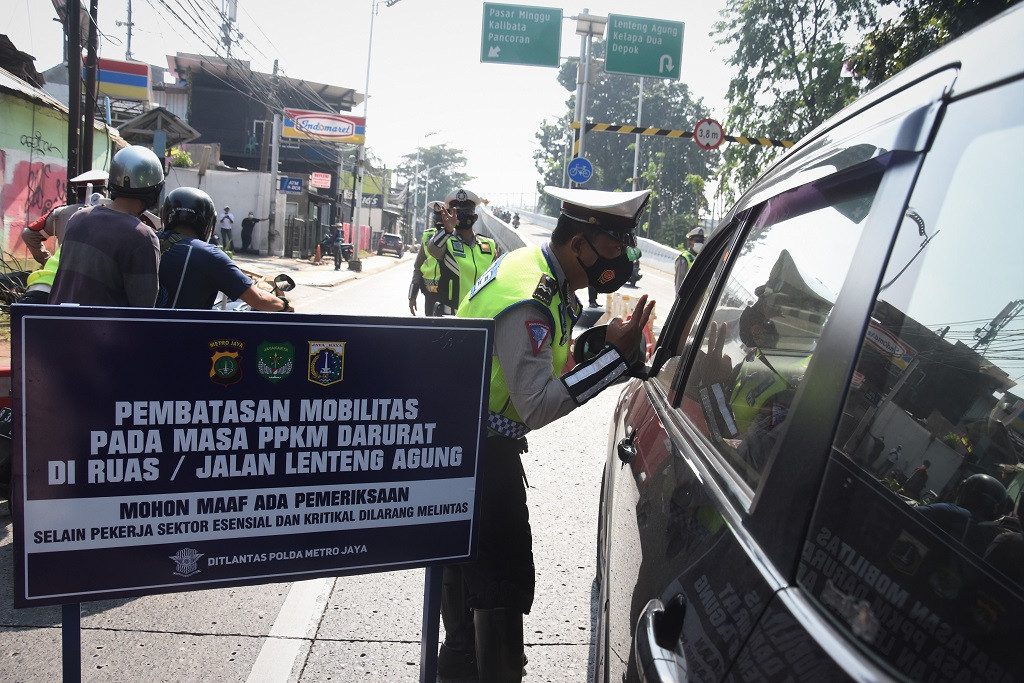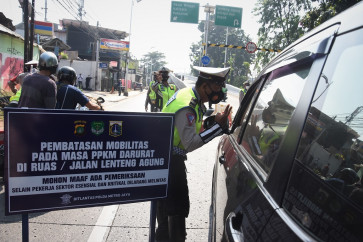Popular Reads
Top Results
Can't find what you're looking for?
View all search resultsPopular Reads
Top Results
Can't find what you're looking for?
View all search resultsPPKM Darurat necessary for sustainable recovery in Indonesia
This recurrence reminds us of when the country needed to shut down most economic activities for a full month in April 2020. Economic growth was curbed immensely due to the mobility restrictions.
Change text size
Gift Premium Articles
to Anyone
 Police officers divert traffic leading to Jakarta at a checkpoint in Jl. Lenteng Agung in South Jakarta on July 3, as the government imposes emergency public activity restrictions (PPKM Darurat) in Java and Bali from July 3 to 20 to stem the alarming surge of COVID-19 cases. (Antara/Indrianto Eko Suwarso)
Police officers divert traffic leading to Jakarta at a checkpoint in Jl. Lenteng Agung in South Jakarta on July 3, as the government imposes emergency public activity restrictions (PPKM Darurat) in Java and Bali from July 3 to 20 to stem the alarming surge of COVID-19 cases. (Antara/Indrianto Eko Suwarso)
T
he government has decided to reimpose mobility restrictions for July 3-20; this time, through emergency public activity restrictions (PPKM Darurat) due to surging COVID-19 infection and death rates. The strict policy needed to be enacted as health facilities have started to be overwhelmed by rising cases, which are the result of an unprecedented second wave of infections, fueled by increased mobility during the Idul Fitri holiday and the more contagious Delta variant.
The mobility restrictions were made to ensure more sustainable health and economic recovery. If implemented under a strict, proper and effective strategy, the much-needed PPKM Darurat will be beneficial in the long run, as public health will be improved, the vaccination program accelerated and economic stimulus deployed faster at the right target.
The PPKM Darurat policy is being imposed across Java and Bali as the most populous islands in Indonesia. Under the rigorous restrictions, nonessential sectors must apply a 100 percent work-from-home policy. All malls and shopping centers must be closed, while supermarkets, traditional markets and shops selling basic commodities are allowed to operate at 50 percent visitor capacity until 8 p.m. Only takeaway or delivery orders are allowed for restaurants, while recreational and sports facilities and cinemas must be closed.
This recurrence reminds us of when the country needed to shut down most economic activities for a full month in April 2020. Economic growth was curbed immensely due to mobility restrictions. Retail consumption dropped by up to 50 percent within two months, while panic buying started in late February 2020, causing stock shortages and instability in basic commodities and health product prices. There was also a correlation between mobility levels and the increasing number of cases, which required extreme measures and a sudden stop of economic and social activities.
However, Indonesia has learned from previous mobility restrictions and economic activities recovered faster than expected. Consumer digital behavior has adjusted in the past year, as consumers are getting familiar with digital transactions and e-commerce platforms.
The people’s response toward the possibility of rising infections has also improved, which is reflected in their personal consumption mitigation plan in coping with a second wave of COVID-19 infections. Apparently, people’s mobility had already decreased one to two weeks before the PPKM Darurat was enacted, showing that people had anticipated the policy and stocked up on basic necessities and health products, without panic buying happening in physical stores.
Based on the Mandiri Institute’s research on retail and restaurant activities during the pandemic, people’s mobility usually picked up within one to two weeks after restrictions are lifted. This is also in line with the tracking of our Mandiri Spending Index (MSI), which shows that with strict mobility restrictions, the index would drop within the range of 13 percent to 15 percent but could rebound relatively quickly. MSI data tracks public spending trends by utilizing high-frequency transaction data based on shopping subcategories, such as supermarkets, restaurants, households and fashion. Java and Bali contributed almost 70 percent of the MSI weighting.

















